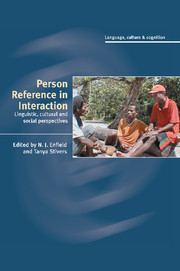Book contents
- Frontmatter
- Contents
- List of contributors
- Preface
- Acknowledgements
- 1 Person reference in interaction
- Part I Person reference as a system
- Part II The person reference system in operation
- 6 Conveying who you are: the presentation of self, strictly speaking
- 7 Person reference in Yucatec Maya conversation
- 8 Principles of person reference in Tzeltal conversation
- 9 The interactional meanings of quasi-pronouns in Korean conversation
- 10 Person reference in Tzotzil gossip: referring dupliciter
- Part III The person reference as a system in trouble
- References
- Index
8 - Principles of person reference in Tzeltal conversation
Published online by Cambridge University Press: 22 September 2009
- Frontmatter
- Contents
- List of contributors
- Preface
- Acknowledgements
- 1 Person reference in interaction
- Part I Person reference as a system
- Part II The person reference system in operation
- 6 Conveying who you are: the presentation of self, strictly speaking
- 7 Person reference in Yucatec Maya conversation
- 8 Principles of person reference in Tzeltal conversation
- 9 The interactional meanings of quasi-pronouns in Korean conversation
- 10 Person reference in Tzotzil gossip: referring dupliciter
- Part III The person reference as a system in trouble
- References
- Index
Summary
Introduction
How does one refer to persons in conversation? How does one pick out an individual from the myriad people in one's social world, so that the interlocutor(s) can home in on a specific individual with known properties – a face, a name, a social identity, a personality – immediately called up? This is a problem that is both frequent and universal, since talking about individual people – what they did, where they went, what they are like, what should be done with them or about them – preoccupies a large proportion of conversations around the world.
Achieving reference of any kind is a matter of achieving mental coordination, and person reference is perhaps especially tricky because participants have to coordinate on a definite, unique individual, not just a class of individuals. Foundational work in conversation analysis (Sacks and Schegloff 1979, reprinted this volume; Schegloff 1996a; see Introduction, this volume) has claimed that how reference to persons is formulated is governed by two basic preferences:
recognitionals are preferred: that is, when the recipient knows the individual, use a referring expression that allows him/her to recognize the intended individual – for example, a name, or a recognitional descriptor, a description ‘designed for the recipient and chosen to indicate how the recipient knows the referent’. There also appears to be a preference for names over descriptive expressions in English-speaker talk.
minimal referring expressions are preferred: that is, using just one referring expression. This means one discrete reference form, however lengthy it has to be to identify the referent to the recipient in the context.
- Type
- Chapter
- Information
- Person Reference in InteractionLinguistic, Cultural and Social Perspectives, pp. 172 - 202Publisher: Cambridge University PressPrint publication year: 2007
- 7
- Cited by



